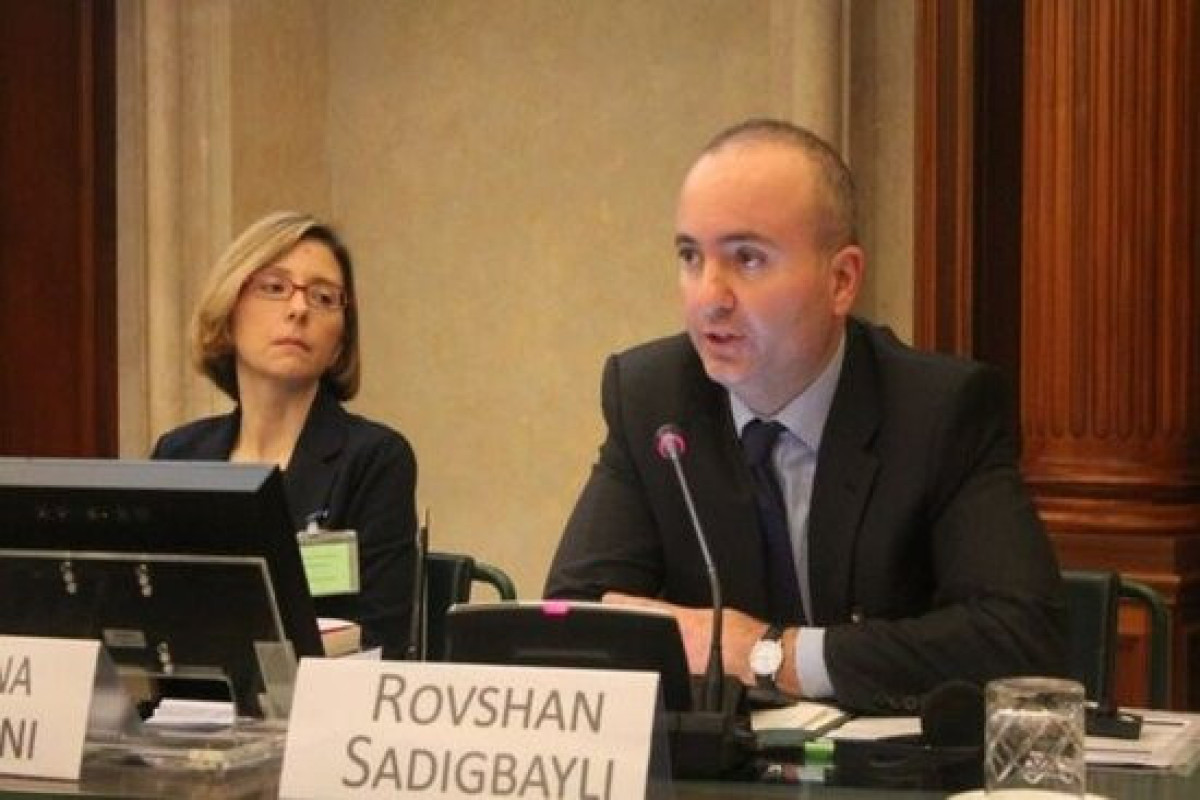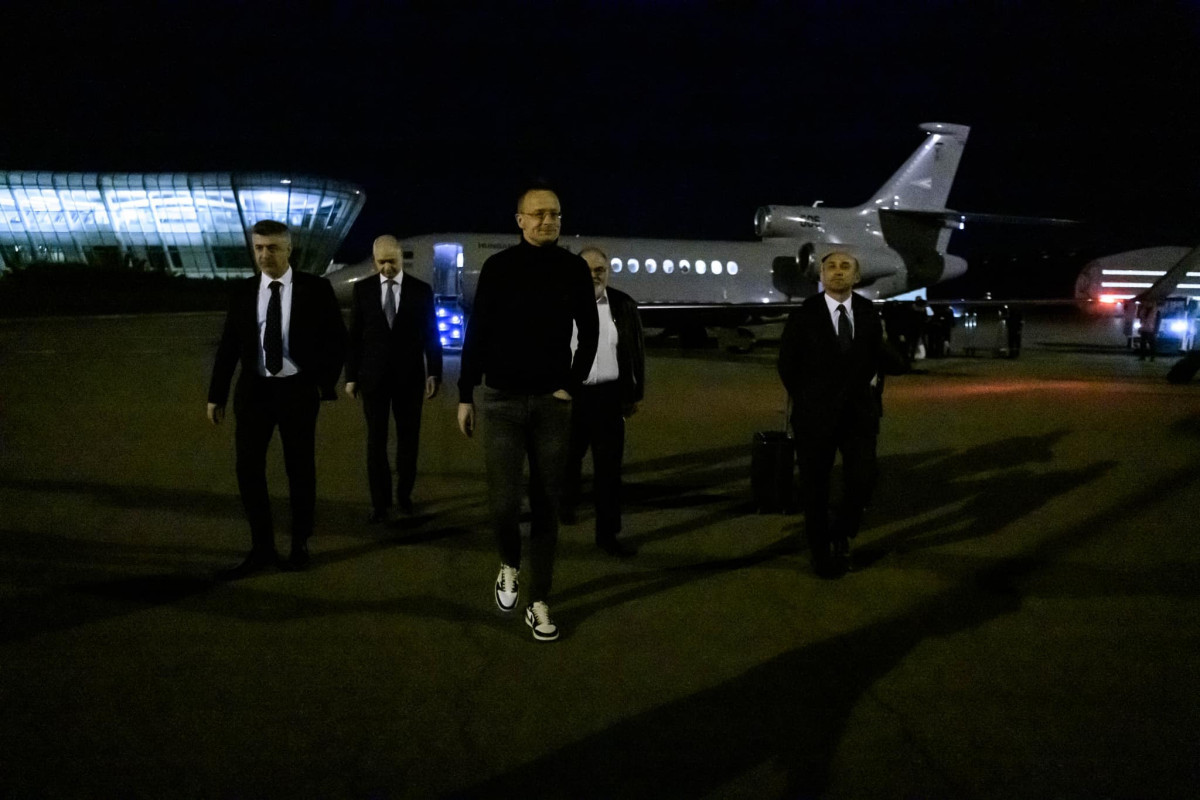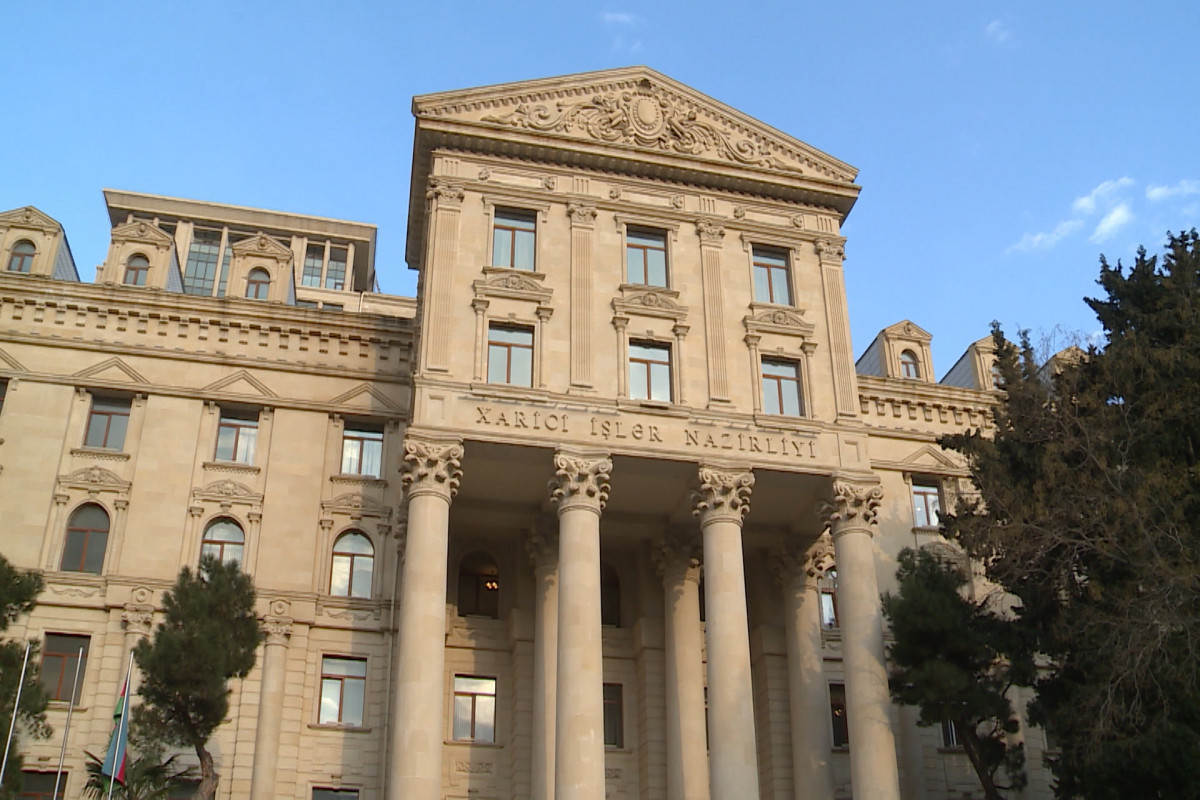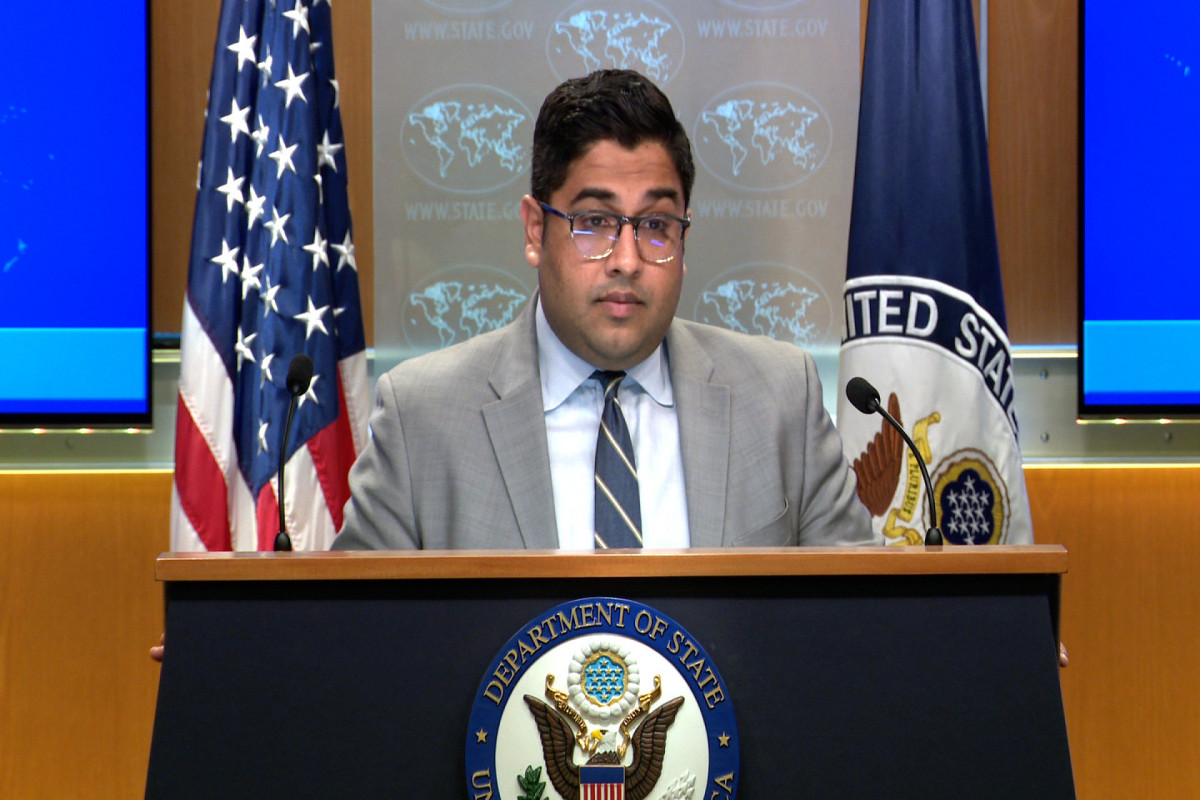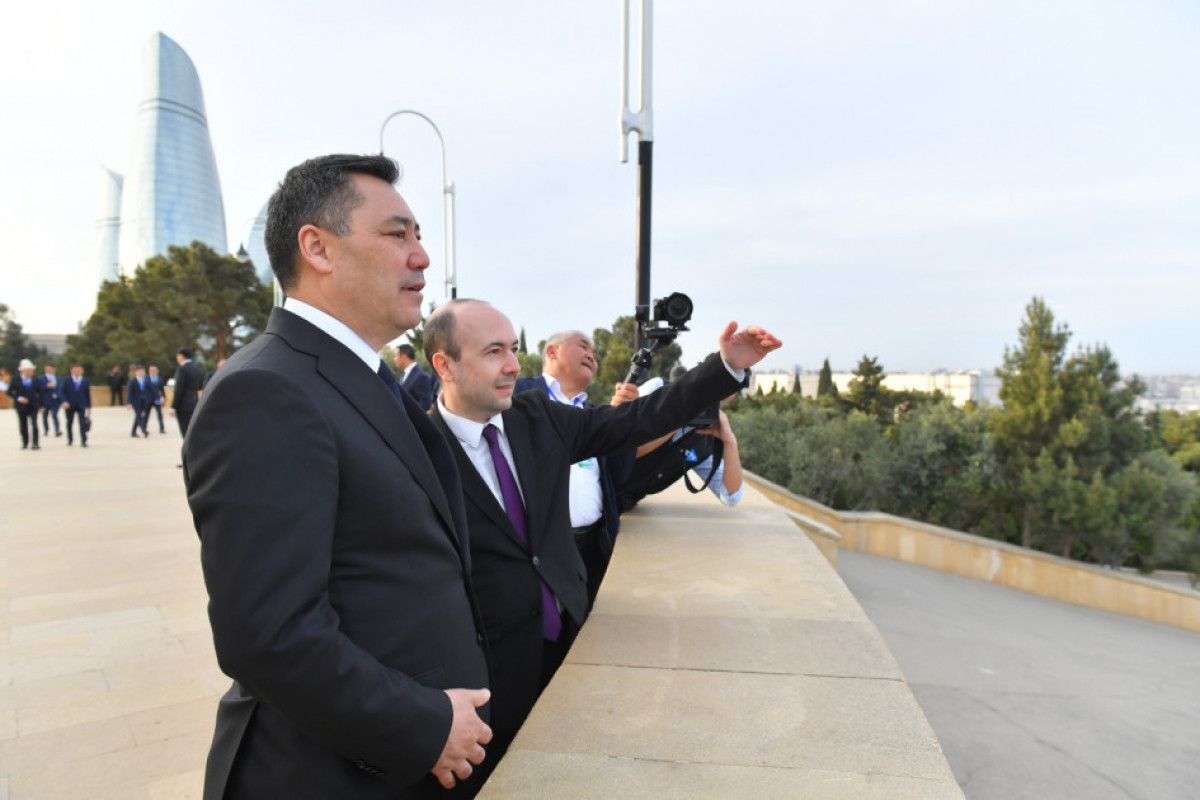"We call on the OSCE to prevent Armenia from committing unacceptable behavior," the statement issued by the head of Permanent Representation of Azerbaijan to the OSCE, Rovshan Sadigbeyli, APA's European Bureau reports.
The Statement says: "Azerbaijan shares the view that moving forward in the negotiation of a peace treaty between Armenia and Azerbaijan is essential. In fact, it is the very premise from which Azerbaijan is consistently proceeding in the post-conflict period. We adopted a coherent and constructive position predicated on consolidation of regional peace and advancing multilateral regional cooperation.
Azerbaijan is on the record, including in this Permanent Council for tirelessly promoting the signing of a peace treaty based on the five basic principles grounded in international law, including mutual recognition of and respect for the sovereignty, territorial integrity and inviolability of internationally recognized borders and political independence of each other - the key word here is mutual; delimitation and demarcation of state border; and unblocking of regional communications. Progress along these tracks falling within the scope of bilateral relations between Armenia and Azerbaijan is indispensable to durable peace in the region.
In this context, Azerbaijan appreciates the mediation efforts of European Council President Charles Michel. To date, four trilateral meetings have been held in the framework of Brussels peace agenda, the most recent one on 31 August 2022 in Brussels. It is expected that another meeting will take place later today in Prague.
We further recall that two more meetings between Foreign Ministers of Armenia and Azerbaijan took place in September. One of them was organized by the U.S. State Secretary Antony Blinken on 19 September in New York. The other was held bilaterally on 2 October in Geneva, in accordance with the task of drafting the text of a peace treaty given to Foreign Ministers as a result of the Brussels meeting. As to references made by Armenian Delegation on the meeting with the US' Senior Advisor for Caucasus Negotiations Philip Reeker and France's Special Envoy for South Caucasus Brice Roquefeuil in Geneva, we are not aware of such a meeting. On 4 October the two Foreign Ministers held a phone conversation at the initiative of State Secretary A.Blinken, as a follow-up to Geneva meeting. Furthermore, on 27 September, the meeting between the Assistant to the President of the Republic of Azerbaijan and the Secretary of Security Council of Armenia took place in Washington DC.
All these meetings focused on the necessity of progress and further substantial steps along three aforementioned tracks, which would provide an immense contribution to normalization process between Armenia and Azerbaijan. At the current critical juncture, the importance of directing all efforts to the normalization agenda and the signing of a peace treaty cannot be overemphasized.
The recent escalation is illustrative of an urgent necessity to start as soon as possible the process of delimitation and demarcation of state border without preconditions and unfounded allegations. especially by third parties. To this end, at the meeting held in Geneva on 2 October, Azerbaijan proposed to move the next meeting of the bilateral inter-State commission on delimitation and demarcation of state border from November to October. Only the process of delimitation and demarcation can allow to determine where the border is and who stands where. To remind, Armenia still refuses to return to Azerbaijan eight enclave villages along the border that the Armenian forces occupied in the 1990s. Armenia questions the legal grounds for the return and claims that this issue needs to be resolved through negotiations. We have not heard from participating States a single call to Armenia to withdraw its remaining forces from the territories of Azerbaijan in line with the trilateral statement and to return to Azerbaijan the enclave villages, where Azerbaijani population used to live.
It is deplorable that yesterday, the units of the Armenian armed forces yet again subjected to fire the positions of Azerbaijan's armed forces in the direction of Kalbajar at undelimited state border. Before that, on 28 September, the Armenian armed forces tried to commit another provocation in the same direction using various calibre weapons. As a result, one serviceman of Azerbaijan was seriously injured. In both cases Azerbaijan's armed forces took adequate measures in response to these provocation attempts.
We urge Armenia to desist from its long-held pattern of behaviour, which is to undermine reached agreements and evade the implementation of its commitments on the eve or in the aftermath of such agreements. We also call on the OSCE to refrain from indulging into Armenia's unacceptable behaviour and send the right messages to Armenia urging this country to focus on the implementation of its obligations by engaging in the normalization process in good faith. This has no alternative to long-term peace and stability in the region.
Instead of approaching the issue of adherence to international humanitarian law in a comprehensive manner, without selectivity and double standards, we hear from some participating States one-sided unsubstantiated accusations, which are deplorable. As a result, the most serious international crimes committed by the Armenian armed forces during the conflict have not received proper attention.
Passing over in silence numerous reports and videos clearly testifying to war crimes committed by the Armenian armed forces against Azerbaijani servicemen, POWs and civilians, is deplorable and hardly conducive to ensuring accountability and ending impunity. One-sided calls could have a negative effect, especially on the day of the Prague meeting between the leaders of two countries. We note that the EU Special Representative for the South Caucasus Toivo Klaar in response to numerous video footage depicting war crimes committed against Azerbaijanis emphasized the need to investigate these and hold perpetrators responsible.
Unlike Armenia, Azerbaijan takes its international obligations under international humanitarian law seriously. All allegations of inhumane and degrading treatment are diligently investigated by relevant authorities. On 17 September, the Military Prosecutor's Office of the Republic of Azerbaijan launched a comprehensive investigation into recently circulated videos on social networks. This investigation was not initiated in response to any appeals but within Azerbaijan's meticulous approach to its international obligations. According to the initial findings, many of the circulated videos are fake. while there are serious doubts as to the authenticity of others.
All Armenian servicemen who were captured by Azerbaijan in the course of the recent escalation were treated fully in line with relevant norms of international humanitarian law. Six of them who were captured with injuries of different types were provided all necessary medical treatment. The ICRC was provided access to visit the captured Armenian servicemen and get familiar with the conditions of their detention. On 4 October Azerbaijan repatriated 17 Armenian servicemen, including those six injured.
We recall that in the course of its aggression against Azerbaijan, Armenia egregiously violated international humanitarian and human rights law by committing countless war crimes against Azerbaijanis, both military servicemen, and civilians. Summary executions, torture, inhumane or degrading treatment of protected persons, mistreatment of POWs and civilian detainees, hostage taking, mutilation of bodies of dead servicemen - all these heinous acts have been ruthlessly committed by Armenian armed forces since the early 1990s. Suffices to recall that in just one night, on 26 February 1992, 613 civilians were brutally killed in the town of Khojaly. Moreover, so far no information has been provided by Armenia on the fate of close to 4,000 Azerbaijanis who went missing since the early 1990s.
Just two days ago, a terrifying mass grave with the remains of 12 Azerbaijani servicemen was unearthed in the Edilli village of the Khojavand district of Azerbaijan. Before being killed, their hands and feet were tied. The investigation is ongoing, but the information available allows concluding that this is yet another instance of summary execution of prisoners of war and hostages. This is not an isolated incident. Another case is the massacre in Balligaya in August 1992, when 24 Azerbaijani civilians. including 6 minors, a 6-month-old baby and a 93-year-old woman were brutally killed, while the bodies of some of the victims were burned. In April 1993, the residents of the Bashlibel village of the Kalbajar district were massacred, while the hostages were subjected to torture. The entire village was destroyed and razed to the ground.
There are also numerous reports and videos depicting various war crimes, including summary killings of Azerbaijani servicemen by Armenian armed forces during the 44-day war of 2020. Furthermore, Armenia was deliberately striking densely populated civilian areas of Azerbaijan located outside the former combat zone, without any military necessity whatsoever. For example, two years ago, Armenia committed war crimes by launching missile attacks on the civilian population of the cities of Ganja, Barda, Mingachevir, and others. We recall that more than 100 civilians were killed as a result of these deliberate and indiscriminate attacks. Numerous detailed reports documenting these war crimes were distributed by our Delegation within the OSCE.
We stress further the indiscriminate massive deployment of mines by Armenia, both old and new. continues to claim lives and cause unnecessary suffering to civilians in Azerbaijan. In total, the number of mine victims in Azerbaijan during the last 30 years stands at 3.336 persons. Since the signing of the 10 November 2020 trilateral statement, 257 persons have become mine victims. Armenia should be held accountable for the indiscriminate use of mines and the non-release of full mine records.
Not a single person has been brought to justice in Armenia for the aforementioned despicable atrocities and war crimes. Neither did Armenia, unlike Azerbaijan, launch any investigation to this end. Armenia must fulfill its obligations, launch investigations into numerous war crimes that its armed forces committed and hold perpetrators accountable before the law. The lack of accountability and impunity enjoyed by the perpetrators of these crimes not only constitutes a defiance of international law and human rights but also represents a direct obstacle to lasting peace and genuine reconciliation in post conflict period.
Mr. Chair,
As to the role of the OSCE to which some Delegations referred, we would like to remind you that any responsible and credible mediation and confidence building requires, inter alia, the consent of parties, the impartiality of the mediators, and compliance with the obligations of States under international law. In accordance with the OSCE documents and decisions, any confidence-building measure must be agreed by the participating States directly concerned. One-sided accusations against Azerbaijan that we have heard today do not contribute to the trust in impartiality and ability of this Organization to play the role of honest broker, which has already been severely eroded during the years of occupation of the territories of Azerbaijan with all the consequences that this entails.
If by the OSCE expertise and tools the EU delegation implies the Minsk Group and other related structures, reference to this obsolete and totally dysfunctional format does not do any credit to the Organization. With its track record of failure to produce any result except consolidation of unlawful occupation of the territories of Azerbaijan, this structure became useless during the conflict and now, in the post-conflict period, references to this structure are counter-productive and harmful. Azerbaijan has expressed clearly its view, including at the highest political level, on the Minsk Group. The consequences of the armed conflict, including the occupation of the territories of Azerbaijan, which the Minsk Group has been called to eliminate, have been ultimately eliminated without the role of the Minsk Group whatsoever. Attempts to revive the Minsk Group and replicate old narratives may only feed into false expectations or illusions, sustain revanchist attitudes still prevailing in Armenia and raise tensions, thus, deviating attention from the post-conflict normalization agenda.
I request that this statement be attached to the journal of the day.
Thank you, Mr. Chairperson."


